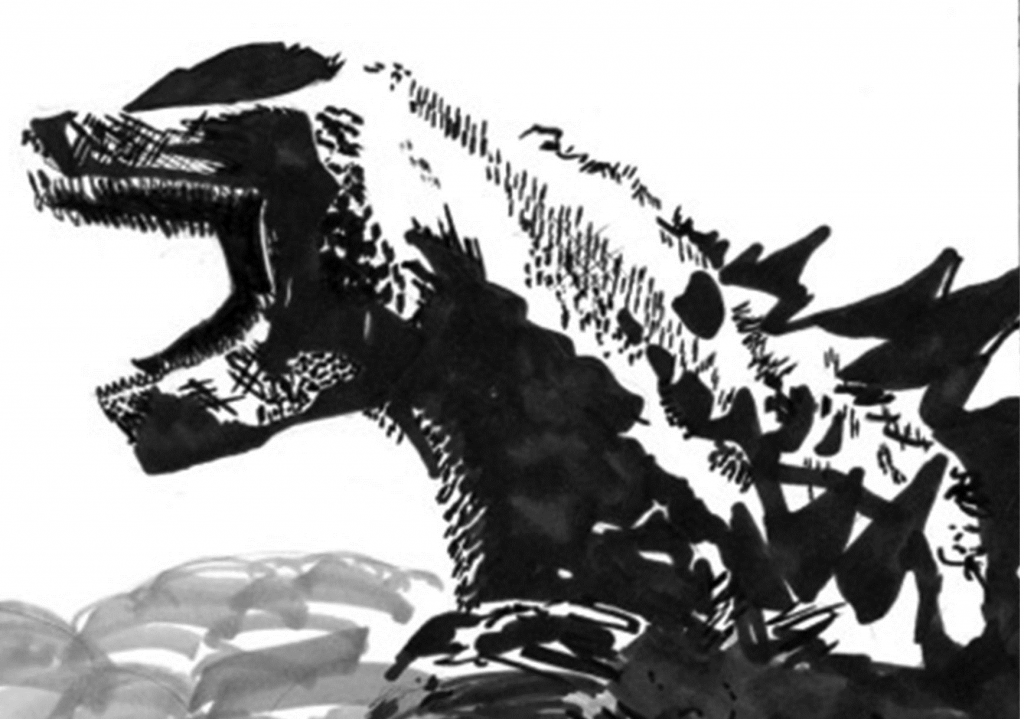With the upcoming Godzilla reboot stomping into theatres May 16 of this year, I thought it would be interesting to look into why we love Godzilla so much. The subject matter is something beyond the typical, mind-numbing destruction porn we have grown accustomed to in films like Transformers, 2012, and Man of Steel. It is expected to carry some real cerebral heft if the trailers and teasers of the film are to be believed, which all have masterfully maintained a sense of dread, horror, and despair for the upcoming movie rather than one of reckless abandonment of everything but destruction of buildings and film-CGI budgets. The film is being helmed by horror-director Gaereth Edwards rather than a huge blockbuster staple like Michael Bay or Peter Jackson, and it appears Edwards is returning to Godzilla’s roots, unlike the last handful of the King Lizard’s reboots. It is this respect for the source material present in the careful presentation of this modern retelling that brought me to consider exactly what Godzilla’s roots are and what our complex relationship with Godzilla implies.
Indeed, for those who are not familiar with the subject matter, Godzilla was not simply a fantasy-minded idea of epic proportions—the original Godzilla of the Japanese film Gojira was in fact a clear metaphor for the nuclear bomb dropped on Hiroshima and Nagasaki that closed out World War II. The senseless destruction of Japan was the heart of the original telling and inception and the monster’s design was based on an alien, unstoppable force that only left destruction in its wake. The original Japanese name—Gojira—actually is a combination of two animals that best described what the beast would look like: gorira (gorilla) and kujira (whale). Thus, Gojira was born. It was not until the beast was westernized for American audiences that the name was changed to Godzilla, which carries significantly different implications with it. With the new name (perhaps un-ironically, knowing the characters original metaphoric intent), a sense of justice was attached to the destruction. From that point on, Godzilla’s original message was watered down and he became a fairly two-dimensional giant monster only present to battle other, more dangerous giant monsters.
The senseless destruction of Japan was the heart of the original telling and inception and the monster’s design was based on an alien, unstoppable force that only left destruction in its wake.
However, what I find interesting is our seeming allegiance not with the humans in these depictions of destruction, but the very beast who causes the devastation. Unlike other forms of destruction porn commonly seen in films, Godzilla seems to have a sense of invincibility—it is hard to imagine how the humans will overcome such a threat, and indeed, there is a feeling that the destruction will only end when Godzilla chooses to relent and return to sleep. There is a purposefulness present in Godzilla that seems odd in comparison to other examples. The destruction in Godzilla’s original debut, and what seems to be coming with the newest retelling, is not for our entertainment and that alone (see Transformers and Man of Steel)—the sheer amount of chaos and death brought on by Godzilla seems to serve the purpose of demonstrating the hopelessness that such tragedy ensues. Indeed, that seems to be the tone of the newest movie—how does one accept that the end, whether explainable or not, has come and that it is unavoidable?
Whereas the original incarnation of the monster represented nuclear destruction, based on the trailers for the new film, this reincarnation seems to represent a carelessness with Nature and its ultimate revenge on humanity. Godzilla rises out of the water as Mother Earth’s champion, eyes set upon civilization in vengeance for its crimes against the world. This is not easy stuff or popcorn fluff, people. And the strange thing is, from what I have seen and experienced myself, we do not necessarily root for the humans in this time of need; in fact, we root for Godzilla himself. Does he represent the metaphoric retaliation of Nature that we have long come to expect from our destruction of habitat and home for other creatures? The mass extinctions we have caused? The mass pollution? Indeed, with the last major earthquake in Japan dumping terrifying amounts of radioactive material into the Pacific Ocean, this image of expected, grave consequences in the not-so-far-future is not a strange idea. Perhaps we root for Godzilla because we know, ultimately, we have had this kind of retribution coming for a long time. Ultimately, no matter what we do to harm the environment, whether that is radioactivity, global warming, or mass pollution, the ultimate victims will be us. The Earth will survive, but it will retaliate in its own way and will balance the scales. This might mean mass flooding, droughts, and all forms of natural disasters, or even just our inability to cope with minimizing food supplies and clean air—we will be decimated by our own actions, but the world will live on.
Godzilla has come to represent that expected consequence of our selfish actions, and in a way, we have no right to fight it. Godzilla represents Nature itself, and just as it can be beautiful and life-giving, it can also be cruel, uncaring, and decimating. That latter half manifests in the imagination as Godzilla. If this all sounds grave and depressing, then perhaps it is time we begin to re-evaluate our place in the world, focusing on how to prevent a “real” Godzilla rearing its terrible head from the depths and bringing Earthly justice on us all. For the religious, perhaps Godzilla will represent the end promised in the Old Testament with the lizard being a direct conduit of God’s wrath on the sinners; for the secular, he is the environmental revenge for centuries of abuse and abandonment; for the cinefile and casual movie-goer, he is a tour-de-force of artistic expression and a reminder of our history as a destructive people. And as the laws of nature dictate, for every action, there must be an equally powerful reaction; if we have yet to experience a repayment for our history of violence and disregard for Nature, then Godzilla represents that anxiety and submission to its eventual arrival.













Be First to Comment